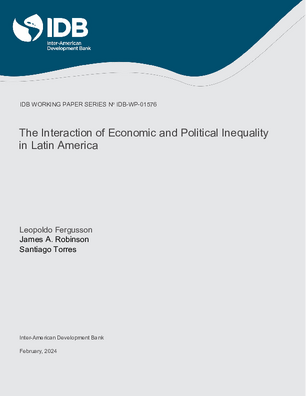The Interaction of Economic and Political Inequality in Latin America
Date
Feb 2024
We investigate how economic inequality can persist in Latin America in the context of radical falls in political inequality in the last decades. Using data from Colombia, we focus on a critical facet of democratization - the entry of new politicians. We show that initial levels of inequality play a significant role in determining the impact of political entry on local institutions, policy, and development outcomes, which can impact future inequality. A vicious circle emerges whereby policies that reduce inequality are less likely to be adopted and implemented in places with relatively high inequality. We present evidence that this is caused both by the capture of new politicians and barriers to institution and state capacity building, and also by the fact that politicians committed to redistribution are less likely to win in relatively unequal places.
Our results, therefore, help to reconcile the persistence of economic inequality with the new political context.
Our results, therefore, help to reconcile the persistence of economic inequality with the new political context.
Generative AI enabled





